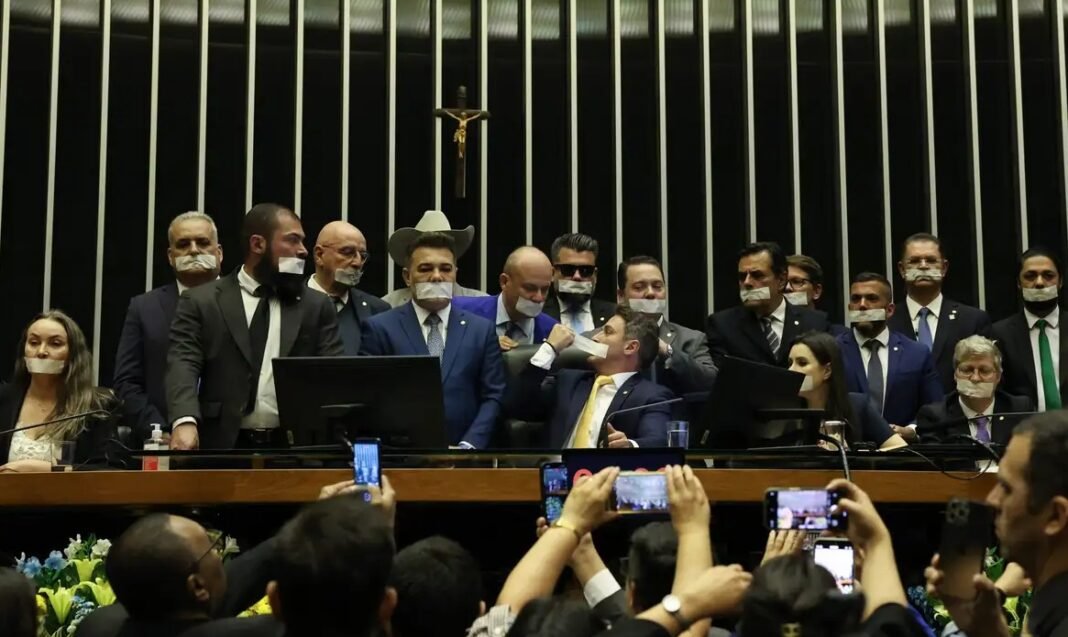The political climate in Brazil has intensified following the occupation of Congress by pro-Bolsonaro lawmakers, a move that has weakened Chamber Speaker Hugo Motta and created space for the Centrão to advance its legislative agenda. The unrest coincides with former President Jair Bolsonaro’s house arrest, which has reignited speculation about Governor Tarcísio de Freitas’s potential presidential run in 2026. Amid this turbulence, the government faces the challenge of responding to the United States’ recent 50% tariff hike on Brazilian goods, with Finance Minister Fernando Haddad outlining protective measures for affected sectors and President Lula preparing a contingency plan alongside Vice President Geraldo Alckmin to safeguard jobs, support small businesses, and manage vulnerable supply chains.
This Content Is Only For Subscribers
To unlock this content, subscribe to INTERLIRA Reports.
Occupation of Congress
The presidents of the Senate, Davi Alcolumbre (União Brasil), and the Chamber of Deputies, Hugo Motta (Republicans), expressed strong irritation at the pro-Bolsonaro senators and representatives who occupied the chambers, declaring they would only leave if the amnesty bill was put to a vote. Tensions escalated after Congressman Eduardo Bolsonaro (PL) publicly challenged the authority of both presiding officers. Alcolumbre and Motta criticized the opposition’s tone, which they viewed as an attempt to impose the legislative agenda through threats, noting that the pro-Bolsonaro bloc lacks the necessary votes to push such measures through.
Motta Weakened
Following the occupation of the Chamber’s Board of Directors, lawmakers believe Speaker Hugo Motta faces a decisive week to prove he can maintain control over the House. Many argue it is time for him to “show leadership in the House’s governance” by enforcing exemplary punishment against those involved. On Friday (08/08), the Board postponed deciding on the suspension of deputies, instead forwarding complaints against 14 members to the Parliamentary Oversight Office. One leader acknowledged that the episode had “weakened” Motta’s political standing.
Centrão’s Advance
The decree placing former President Jair Bolsonaro (PL) under house arrest—now in its first week—triggered unrest among allies in Congress and produced political ripples across government, opposition, and the influential Centrão bloc. Within the Executive, there is concern that Motta’s weakened authority in managing the protests could lead to instability in the legislature, a scenario that no administration desires. The Centrão seized the moment to advance a proposal that would shield lawmakers from Supreme Federal Court (STF) actions, while the opposition regrouped, rallying against Justice Alexandre de Moraes, who issued Bolsonaro’s arrest order, and signaling support for an amnesty bill for those convicted in the January 8th attacks.
Tarcísio’s Return
Bolsonaro’s house arrest, criticized even by Supreme Court justices, has revived discussions among allies of Governor Tarcísio de Freitas (Republicans) about positioning him as the Bolsonarist presidential candidate in 2026. This renewed interest follows weeks of waning enthusiasm. Until recently, Tarcísio saw the political environment as unfavorable for his group, especially after facing criticism from multiple political fronts—both for attempting to intervene in the tariff hike issue, for remaining silent on US sanctions against Supreme Court Justice Alexandre de Moraes, and for failing to address recent Bolsonarist mobilizations.
Protective Measures
Finance Minister Fernando Haddad announced on Wednesday (06/08) that the Ministry will submit protective measures for sectors affected by US President Donald Trump’s tariff hike to the Planalto Palace for approval. While the timing of the announcement will be decided by the Presidency, Haddad indicated the focus would be on safeguarding small businesses. The measures may include subsidized credit lines, although specific actions remain undisclosed. He also noted the possibility of implementing an employment protection plan similar to measures adopted during the COVID-19 pandemic.
Contingency Plan
President Lula (PT) will meet with Vice President and Minister of Development, Industry, Commerce, and Services Geraldo Alckmin on Monday (11/08). They are expected to finalize the details of the contingency plan, which seeks to contain the impact of the 50% tariffs imposed by the United States on Brazilian products. The plan should include:
- Lines of credit for companies impacted by the American sanctions, to finance investments and working capital.
- postponement of federal tax and contribution collections for up to two months, repeating a move adopted by the Planalto Palace during the Covid-19 pandemic;
- Public purchases of perishable goods. There is concern about food stocks such as fish, fruit, and honey, which have been stagnant since US President Donald Trump’s announcement.
Analysis:
The current political scenario in Brazil illustrates a convergence of institutional strain, economic pressure, and shifting electoral strategies. The move by pro-Bolsonaro lawmakers has not only undermined Speaker Hugo Motta’s authority but also created an opening for the Centrão to push forward its legislative priorities, particularly measures aimed at shielding lawmakers from judicial oversight. At the same time, Bolsonaro’s house arrest has reignited the Bolsonarist base, prompting renewed consideration of Governor Tarcísio de Freitas as a potential presidential candidate, despite his recent political missteps.
Economically, the government faces a pressing challenge in countering the United States’ steep tariff hike, which risks disrupting key export sectors and triggering job losses. Finance Minister Fernando Haddad’s proposed protective measures and President Lula’s contingency plan aim to cushion the blow, particularly for small businesses and vulnerable supply chains.
Sources: G1 [1], [2], [3], [4], [5]; A Folha de SP [1], [2]; Valor.




